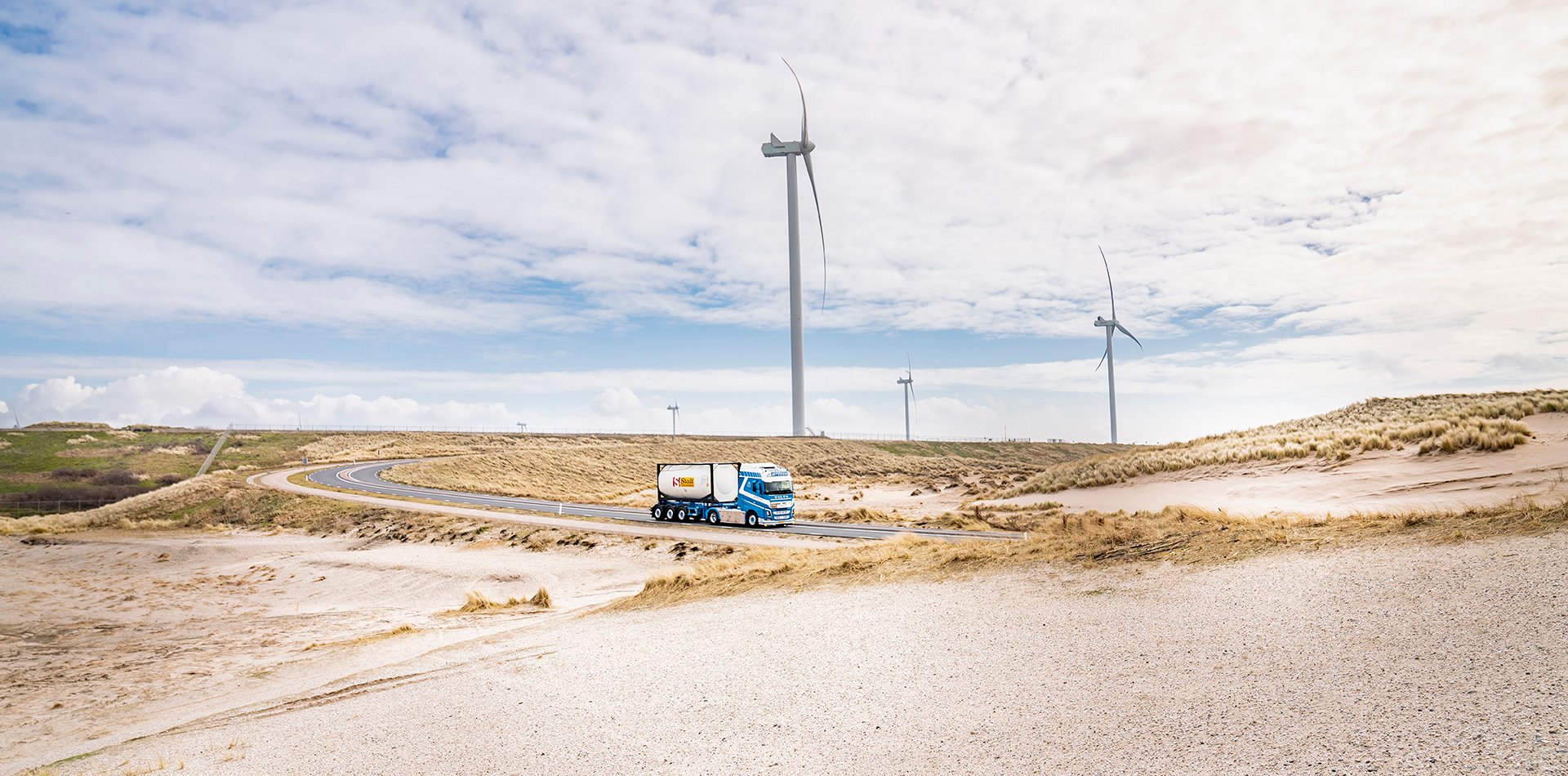Do you have any generic questions about sustainability? Find answers here.
-
What is Stolt Tank Containers (STC) doing in terms of sustainable growth?STC is part of Stolt-Nielsen (SNL), a global leader in liquid logistics. The company is engaged in partnerships, projects and industry organisations to explore possibilities to minimise the impact of its operations on the environment and support the wider supply chain and our customers to do the same, while pursuing business opportunities for sustainable growth. In 2023, we launched a horizontal workstream on sustainability to develop the roadmap and strategy.
-
What are the intermodal solutions STC offers to customers?Stolt Tank Containers (STC) offers intermodal transportation via road, inland waterways, sea and rail to lower CO2 emissions. We also work with deep sea carriers and truckers that offer shipping and transportation options with alternative, low-emission fuels such as biofuels or LNG. Read more.
-
Does STC work together with its suppliers when it comes to sustainability?
Yes, we work closely with our suppliers to enhance the sustainability of our respective operations. Within our social and governance pillars, STC has added minimum requirements and contracts with suppliers to commit to the SNL business conduct principles and rules set out in this suppliers’ code of conduct to ensure that all suppliers performing services on behalf of the company conduct their business and achieve their targets in an ethical, honest and legal manner.
Under our environmental pillar, STC requires truckers to share their action plans for CO2 reduction and data on carbon emissions from truck per transport (for STC). We have also added sustainability RFI questions for the shipping lines.
Additionally, we are working together with truckers to identify potential lanes to which trucks can switch to lower carbon emissions from fuels, and with shipping lines to offer the carbon in setting solutions to STC customers.
Of course, we remain dedicated to our core intermodal business, and we are continuously seeking to strengthen our rail and inland waterways network. For example in Germany we use electric trains with zero carbon emissions.
-
How does STC help customers to reduce CO2e emissions?Carbon dioxide equivalent (CO2e) is used to measure and compare the global warming impact of carbon dioxide and other greenhouse gas emissions on the environment. At Stolt Tank Containers, we are committed to moving towards a more sustainable future. As part of this commitment, we provide low-carbon and circularity solutions to help our customers reduce their Scope 3 greenhouse gas (GHG) emissions that come from the transportation of products from A to B and heating and cleaning tanks at our depots. Intermodal transportation using ISO tank containers is our core activity towards net zero.
At the same time, we are looking at carbon insetting options with our deepsea carriers and at switching to low-carbon-emission fuels with our truckers. In our own depots, we switch to green power when possible reducing the emissions generated from heating, cleaning and repairing the tanks for customers. Additionally, STC has developed a carbon tracking tool of CO2e emission estimates for customers which is available on mySTC.
-
What greenhouse gas (GHG) emissions does STC generate?Scope 1 – direct emissions that occur within our own depots & offices associated with fuel combustion in boilers for heating products and diesel burned from trucks for shunting.
Scope 1 – direct emissions that occur within our own depots & offices associated with fuel combustion in boilers for heating products and diesel burned from trucks for shunting.
Scope 2 – indirect emissions that occur within our own depots and offices associated with purchased energy used for electricity and heating.
Scope 3 – indirect emissions that occur outside of its depots and offices, during: operations at 3rd party depots, transportation of products from point A to point B by non-owned deep-sea carriers, barge, rail and truckers, business travels of STC employees will all type of modalities.
-
How are STC customers affected by the European Union Emissions Trading System?We are currently not passing on the European Union Emissions Trading System (EU ETS) costs to customers by issuing a separate invoice or charge. Instead, the EU ETS charge will be built into our pricing, making it easier for our customers to process invoices and ensuring we stay as competitive as possible in this market.
We will keep a close eye on further EU ETS developments and will update customers as needed.
• Find out more here.
• Read the EU ETS FAQs.
-
How can STC customers track their carbon emissions?STC has developed a carbon tracking tool of CO2e emission estimates for all transport modes which is available on the bookings page on mySTC. This gives the customer transparent and accessible insights into the carbon footprint of each shipment to help them with route optimisation and further reductions in their carbon footprint.
-
What are STC's sustainability memberships?STC is an industry leader in sustainability and actively seeks collaboration with all stakeholders in the supply chain. We currently hold memberships with:
• International Tank Container Organisation (ITCO), which focuses on a safe, cost-effective, environmental and adaptable mode of transport for liquids and gases,
• EcoTransIt which is a globally recognised calculation tool in global transport sector.
• Smart Freight Centre, an international non-profit organisation focused on reducing greenhouse gas emission from freight transportation.
• European Chemical Transport Association (ECTA), which aims to improve standards in efficiency, safety and quality and reduce the environmental and social impact of the transport and logistics of chemical goods in Europe.
-
Is STC measuring the sustainable impact of its business activities?Yes, we do. We are measuring our ESG indicators, which we disclose each year in Stolt-Nielsen's annual report, in line with SASB standards and as per Corporate Sustainability Reporting Directive (CSRD) by fiscal year 2025.
STC is developing KPIs and targets in line with CSRD which are also rated annually by the Ecovadis certification scheme. In 2024, STC achieved an EcoVadis Gold rating, placing us in the top five percent (97th percentile) of companies in the supply chain industry. In three categories (environment, ethics and sustainable procurement), we improved by ten points, and we achieved a 20-point improvement in labour and human rights.
-
How does STC help support a more circular economy?
STC uses ISO tank containers to transport bulk liquids which minimises waste and reduces emissions compared to transport using drums, bottles, or flexi-bags. This is because tank containers are reusable over a period of approximately 20 years, allowing each tank to carry many products during its lifecycle. Furthermore, unlike other transportation methods, 90% of the materials in an ISO tank can be recycled and, because products are bottled/packaged at their destination using ISO tanks avoids shipping heavy packaging weight across the world.
We are also proud of the circularity innovations in our own depots. Thanks to innovative recycling techniques, STC is keeping water, energy and detergent usage to a minimum during the cleaning of our tank containers. Our depots have established a KPI workbook mapping the quantity of all types of waste disposed, reused and recycled. As part of our circularity goals, we have recently started a pilot project to reuse gaskets at our depots in Moerdijk, Netherlands, and Houston, US, and we are investigating possibilities for multiple manlid usage for specific lanes for non-hazardous products.
• Read more about our sustainability initiatives.
• Read more about the benefits of ISO tank containers.


